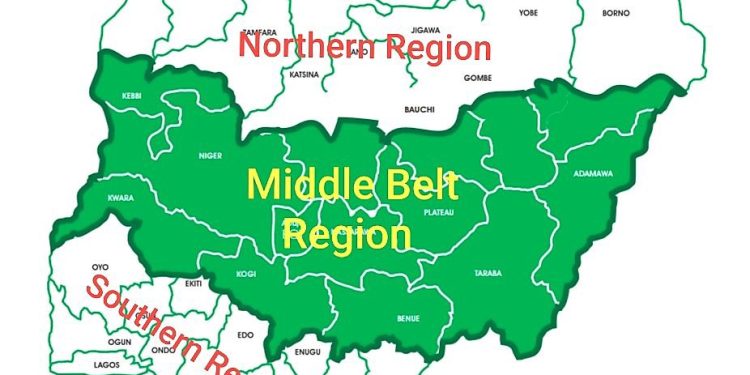Middle Belt Forum Draws Battle Lines Over Sultan’s Proposed Permanent Traditional Leadership Role
(Makurdi), The Middle Belt Forum has thrown down the gauntlet in what promises to be one of the most heated constitutional debates of 2025, declaring unequivocal opposition to a clause in the National Council for Traditional Rulers of Nigeria Bill that would make the Sultan of Sokoto a permanent co-chairman of the proposed national body.
In a strongly-worded statement released Sunday, the forum’s National Spokesman, Luka Binniyat, described the provision as a “grievous insult” to ancient Middle Belt kingdoms and warned of mass boycotts if the legislation passes in its current form.
The controversy centers on the National Council for Traditional Rulers of Nigeria (Establishment) Bill, 2024, sponsored by Senator Simon Bako Lalong of Plateau South. Having sailed through its second reading in March, the bill now sits before the Senate Committee on Establishment and Public Service, where its fate—and potentially the unity of Nigeria’s traditional institution—hangs in the balance.
Ancient Kingdoms Challenge Modern Politics
At the heart of the Middle Belt Forum’s objection lies a compelling historical argument that challenges conventional assumptions about traditional hierarchy in Nigeria. The forum contends that several Middle Belt monarchies predate the Sokoto Caliphate by centuries, making the proposed permanent arrangement historically unjustifiable.
“The Kwararafa Confederacy flourished from the 800s to the 1700s A.D.,” Binniyat noted, pointing to the Aku Uka of Wukari as the spiritual heir to a legacy that existed long before the Sokoto Caliphate’s establishment in 1804. Similarly, the forum highlighted the Attah of Igala, whose kingdom thrived before and after the 14th century, and the Etsu Nupe, representing a 15th-century kingdom that maintained its cultural identity despite later Islamic influence.
Perhaps most significantly, the forum emphasized that the Tiv Nation—one of Nigeria’s largest ethnolinguistic groups—was never conquered by the Sokoto Caliphate. The Tor Tiv, they argue, represents a proud, independent people whose acephalous society thrived without external domination.
Religious Leadership Versus Traditional Authority
The Middle Belt Forum’s opposition extends beyond historical precedence to fundamental questions about the nature of leadership in a pluralistic democracy. They argue that the Sultan’s primary role as the spiritual head of Nigerian Muslims makes his permanent secular leadership problematic in a constitutionally secular state.
“His institutionalized leadership over a national council of traditional rulers would alienate Christians, traditional worshippers, and other faiths,” the statement declared, warning that such an arrangement would “promote religious supremacy under the guise of traditional unity.”
This concern gains additional weight from the forum’s pointed reference to the Sultan’s patronage of the Miyetti Allah Cattle Breeders Association (MACBAN), an organization they link to violent conflicts that have claimed thousands of lives across the Middle Belt. The forum argues that making someone with such associations a permanent leader would be insensitive to victims of these conflicts.
Colonial Legacy and Modern Resistance
The statement reveals deep-seated resentment about colonial-era impositions that artificially elevated certain traditional authorities over others. The forum argues that British indirect rule forcefully placed autonomous Middle Belt communities under Emirate control, creating “an artificial hierarchy that granted undue privilege and influence to Fulani-dominated Emirates.”
“More than six decades after the end of colonial rule, it is unacceptable for any traditional authority to be elevated above others, particularly in a democratic Nigeria that champions equality, justice, and federal character,” Binniyat emphasized.
This historical grievance underscores why the current proposal strikes such a sensitive nerve. For many in the Middle Belt, permanent co-chairmanship arrangements evoke memories of colonial subjugation that independent Nigeria was supposed to remedy.
High-Stakes Threats and Alternative Proposals
The Middle Belt Forum has not limited itself to criticism—it has issued concrete threats that could fragment Nigeria’s traditional institution. Should the bill pass with the contentious clause intact, the forum promises to mobilize all Middle Belt ethnic nationalities to boycott the council entirely.
More dramatically, they threaten to establish an autonomous Council of Middle Belt Traditional Rulers, effectively creating a parallel institution that could undermine the national body’s legitimacy and effectiveness.
However, the forum also offered constructive alternatives, proposing that the chairmanship be rotational across geopolitical zones or ethnic blocs, with tenure-based arrangements ensuring all traditional rulers feel included. They suggest allowing traditional rulers themselves to democratically choose their leadership through transparent, inclusive processes.
National Unity at a Crossroads
As this debate unfolds, it highlights deeper tensions about identity, representation, and historical justice in modern Nigeria. The Middle Belt Forum’s position reflects broader anxieties about religious and ethnic dominance in a diverse nation still grappling with colonial legacies.
Senator Lalong, ironically described by the forum as “a respected son of the Middle Belt,” now finds himself at the center of a controversy that could define his legislative legacy. As the Senate Committee on Establishment and Public Service deliberates, they face a choice between maintaining the bill’s current structure and risking institutional fragmentation, or finding compromise solutions that address historical grievances while preserving national unity.
The stakes could hardly be higher. Traditional rulers have long served as bridges between Nigeria’s diverse communities and the federal government. Any arrangement that alienates significant segments of this institution could have far-reaching consequences for national cohesion.
As one traditional ruler privately noted, “This is not just about who sits where in meetings. It’s about whether Nigeria can create institutions that truly reflect our diversity and shared humanity.”
The coming weeks will reveal whether Nigeria’s lawmakers can navigate these treacherous waters or whether the ancient kingdoms of the Middle Belt will chart their own separate course in the nation’s traditional landscape.


